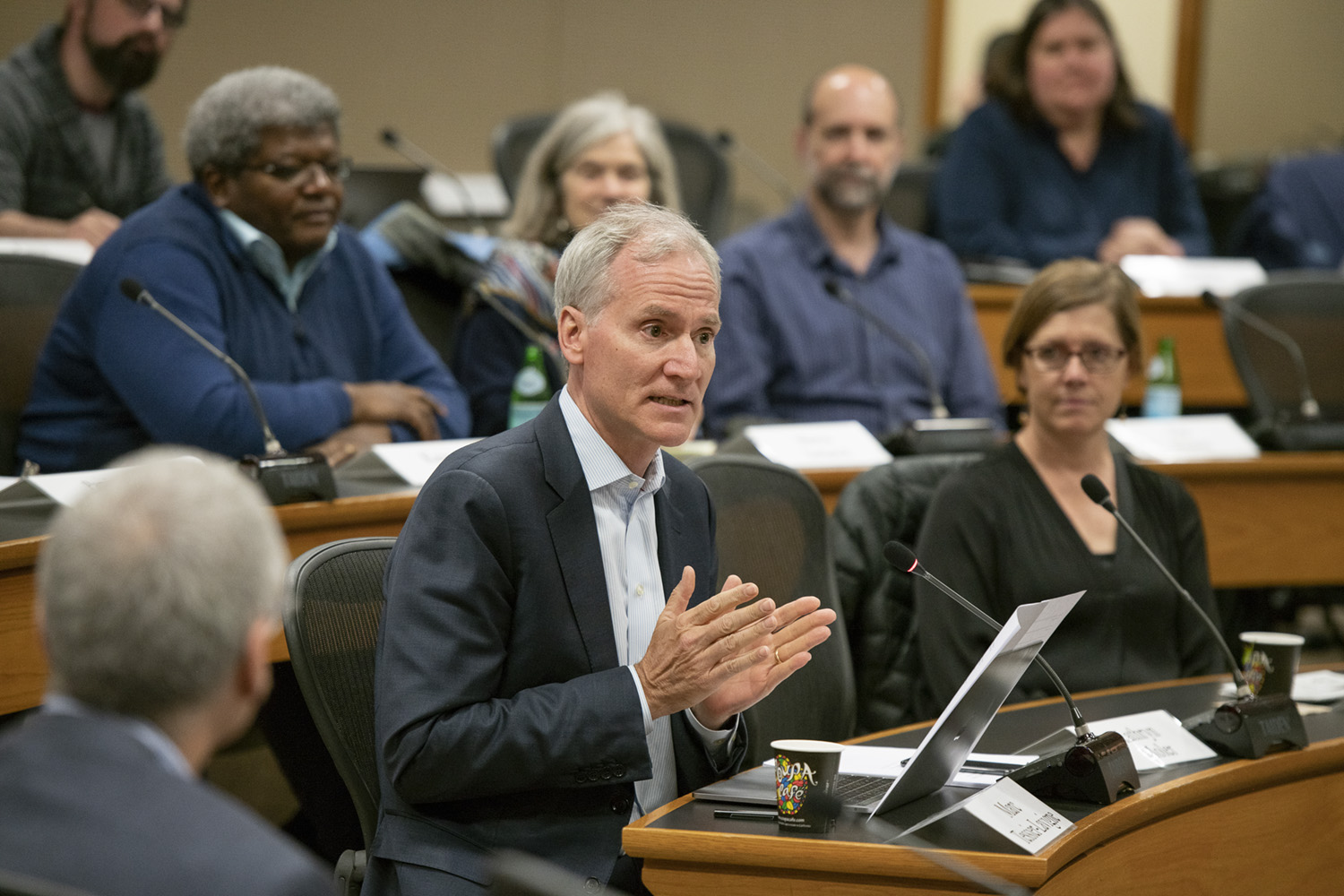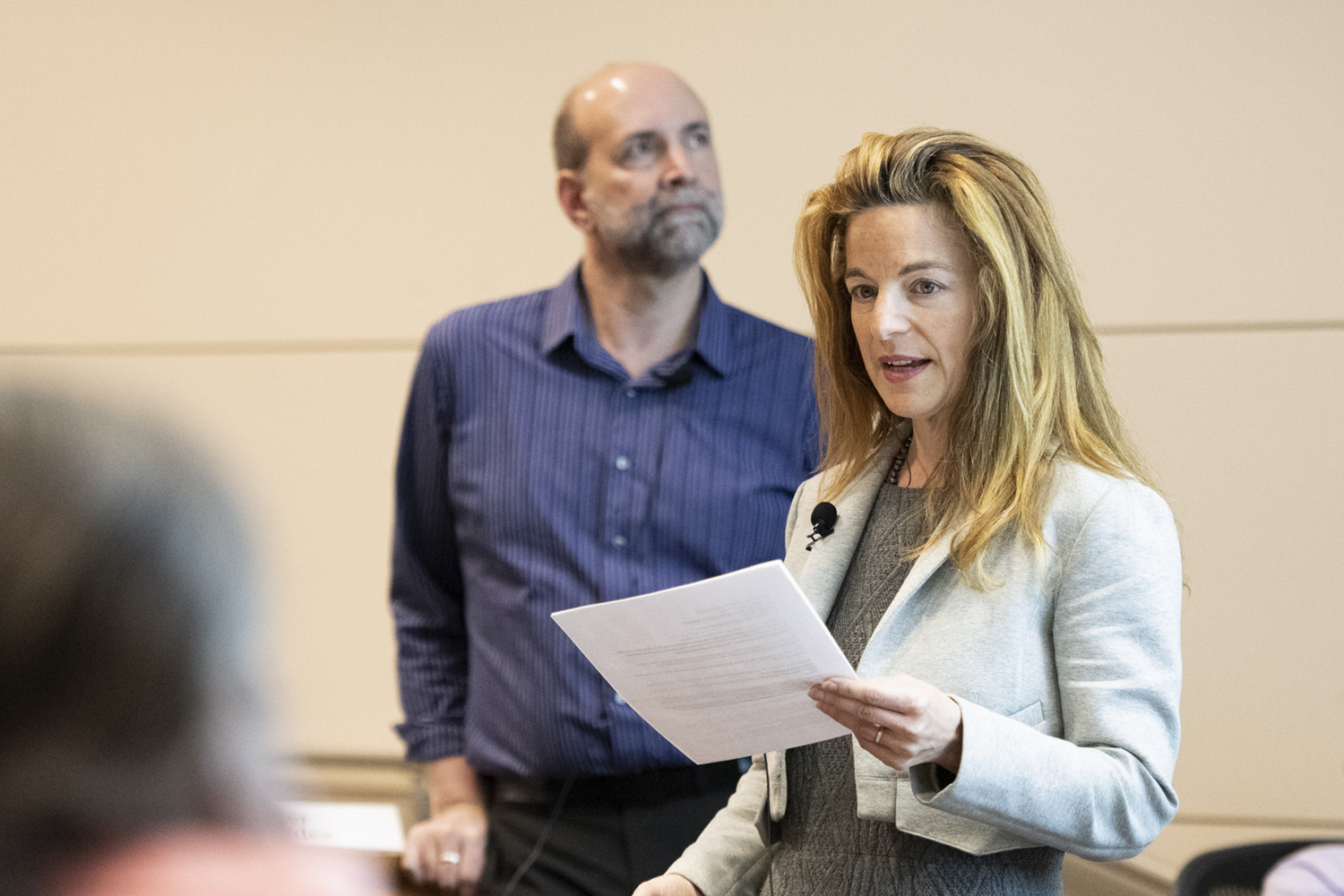President, provost update Faculty Senate on admissions fraud issue
The meeting also featured a report from the Committee on Review of Undergraduate Majors.
At Thursday’s Faculty Senate meeting, President Marc Tessier-Lavigne and Provost Persis Drell updated senate members on the national college admissions fraud scheme as it pertains to Stanford, and outlined steps that the university has taken to ensure the integrity of its admissions process.
Also at the meeting, the senate’s Committee on Review of Undergraduate Majors (C-RUM) reported on its work in monitoring the academic quality and effectiveness of the undergraduate degree-granting and honors certification programs, along with its role in reviewing the undergraduate interdisciplinary programs.
Admissions fraud scheme update

President Marc Tessier-Lavigne reports to the Faculty Senate about the recent national college admissions fraud scandal. (Image credit: L.A. Cicero)
Tessier-Lavigne began his report to the senate by summarizing developments around the admissions fraud scheme, which arose after the senate’s last meeting of the winter quarter. He noted that information from the university and statements from university leadership have been provided on a Stanford website.
As Tessier-Lavigne reported, last month the U.S. Department of Justice charged numerous people in a scheme in which payments were made in hopes of winning the admission of prospective students to a number of U.S. colleges and universities.
Stanford’s former head sailing coach admitted to accepting financial contributions to the sailing program in exchange for providing athletic recommendations to the admission office for two prospective students. Neither of those students was admitted to Stanford. In the process, a third student was found to have provided falsified information on the application for admission; the university rescinded that student’s admission and the student is no longer at Stanford.
“The whole episode is just completely appalling. It’s antithetical to the values of the university. It’s completely out of line with the expectations we have for ethical conduct at the university, and we can’t say that forcefully enough,” said Tessier-Lavigne.
He then reviewed the steps the university has taken since the scheme came to light, including:
- An external review of the procedures followed in providing Athletic Department recommendations for the admissions process, as well as procedures around the acceptance of gifts for athletic programs
- Confirmation of the authentic athletic credentials of all student-athletes in this year’s application pool
- A new system for second-level review of athletic credentials of student-athletes recruited by Stanford’s coaches
- In cooperation with government authorities, the university is looking for an appropriate way to redirect the funds that were fraudulently contributed to Stanford’s sailing program
“We are looking at this very broadly and very deeply,” he said.
Drell noted that the university also recently completed the undergraduate admission process for the Class of 2023, and she touched on larger themes raised by the admissions fraud scheme.
“In addition to reviewing all of our practices and procedures, as Marc described, I actually think we need to do a better job of helping the public understand how we admit students and how we work to expand college opportunity for those who do not come from privilege – including through financial aid,” she said.
Drell noted that two-thirds of Stanford undergraduates receive financial aid, about half receive need-based scholarship support from Stanford and more than 80 percent graduate with no student debt.
She said that 18 percent of the newly admitted undergraduate class are the first generation in their family to attend college, and that the class as a whole represents great geographic and ethnic diversity as well as diversity of interests and experiences.
“It’s really important for us and for the public to know that we are working hard to be an engine of opportunity for new generations of students,” said Drell.
Drell also spoke about Stanford’s implementation this year of the new practice of not publicly announcing the number of applicants in the pool, a decision announced last summer.
“It’s one small step, we hope, toward reducing the emphasis on selectivity and low admissions rates that we believe totally distorts what the college admissions process should be,” she said.
Committee on Review of Undergraduate Majors
Stanford’s interdisciplinary programs add academic diversity and vitality to undergraduate education and help “de-silo” departments across the university, according to leaders of the Committee on Review of Undergraduate Majors (C‑RUM).

Laura Wittman, right, gives the report from the Committee on Review of Undergraduate Majors, with Tim Stearns. (Image credit: L.A. Cicero)
Laura Wittman, associate professor of French and Italian and chair of C‑RUM, and Tim Stearns, professor of biology and genetics and chair emeritus of C-RUM, reported on the committee’s work in monitoring the academic quality and effectiveness of the undergraduate degree-granting programs and in reviewing the interdisciplinary programs (IDPs).
In her presentation to the Faculty Senate, Wittman said that C-RUM reviews the IDPs in order to recommend renewal or, in rare cases, discontinuation of programs. The committee also receives proposals for all new undergraduate programs – IDPs, departmental majors and honors certification programs – and develops recommendations for action by the Faculty Senate, which must approve all new programs.
There are currently 20 active IDPs, which span a variety of academic areas and vary widely in size. Programs with the highest number of majors include human biology (251), symbolic systems (193), science, technology, and society (141) and international relations (119).
Wittman cited some of the common challenges for interdisciplinary programs, including the difficulty of maintaining the continuity of course offerings and the reliance on a small number of faculty. While faculty are dedicated to the success of the programs, it can be difficult to build community among faculty, most of whom have commitments to other departments, said Wittman. Other challenges include helping students find advisors and educating faculty advisors about degree requirements.
Despite these issues, students express great satisfaction with IDPs, citing the strength and flexibility of the programs, the engagement of the faculty, the breadth of opportunities offered and excellent preparation for further studies, said Wittman.
During the comment portion following the presentation, several senate members expressed interest in finding more opportunities where the IDPs could intersect productively with the university’s interdisciplinary research centers and institutes.
The full minutes of the meeting, including the questions and answers that followed the reports, will be available soon on the Faculty Senate website. The next senate meeting is scheduled for April 25.
